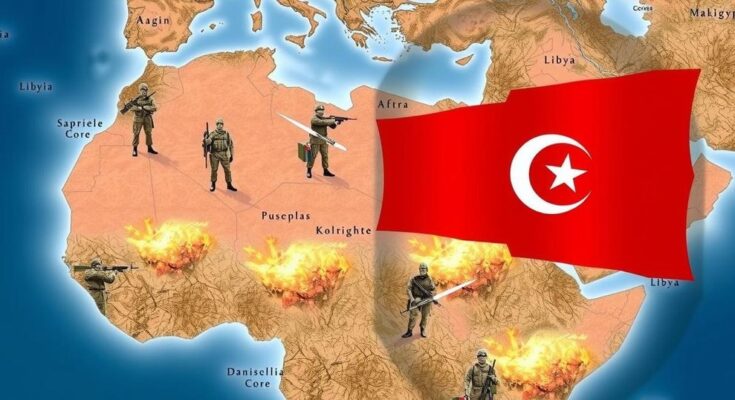Following the fall of Bashar al-Assad in Syria, Russia is shifting its strategic focus to Libya as it seeks to maintain its influence in Africa. Russian military support for Khalifa Haftar’s forces demonstrates this pivot, as does the transfer of military assets from Syria. Despite the challenges of fragmented Libyan politics and international scrutiny, Russia aims to re-establish its foothold in the region while navigating intricate relationships with multiple factions.
Russia is reorienting its focus from Syria to Libya following the upheaval created by the fall of Bashar al-Assad. Experts highlight that this strategic pivot seeks to maintain Russia’s presence in North Africa and sustain its missions across the continent, particularly given the recent shifts in Syria under new leadership. With Russian mercenaries backing Khalifa Haftar’s Eastern Libyan forces, Moscow appears to be facilitating military support, including the transfer of significant military resources previously stationed in Syria.
The loss of a reliable ally in Syria necessitates this shift, as Libya offers an alternative platform from which Russia can exert influence. The movements of Russian military assets into Libya, such as the deployment of anti-aircraft systems, align with Moscow’s strategy to disrupt Western interests and expand its foothold in Africa. This enmeshment in Libyan affairs reflects a long-term ambition to integrate military capabilities and resources strategically across the Mediterranean and African regions.
Interactions between various factions in Libya complicate Russia’s aspirations; while it navigates relationships with Haftar and the United Nations-backed Government of National Unity in Tripoli, concerns from Western nations remain prevalent. Furthermore, monitoring from allies, notably Turkey and Egypt, adds layers of complexity to Russia’s ambitions, necessitating more transparent operations than were possible in the secrecy of Syrian territory.
In summary, the Kremlin’s adaptation to engage with Libya’s fragmented political landscape aims to secure its interests in Africa while mitigating losses from the Syrian theater, although challenges in the region may undermine its efforts. The need for a contingency plan underscores the delicate balance Moscow must maintain between supporting local powers and pursuing its strategic objectives. Such a multifaceted approach demonstrates the continuing evolution of geopolitical dynamics within North Africa.
Russia’s military strategy in the Mediterranean has historically relied on the stability of alliances, particularly with Syria. The fall of Bashar al-Assad disrupted this balance, prompting Russia to diversify its foothold in the region by concentrating efforts on Libya. With existing military assets in Syria facing operational threats, Libya represents an alternative pathway to project power and influence within the complex political landscape of North Africa, historically marred by fragmentation and external interests. Russian mercenaries have already established a presence in Libya, supporting warlords like Khalifa Haftar, which further solidifies this strategic realignment.
In conclusion, Russia’s consideration of Libya as a pivotal alternative to Syria reflects its broader strategy of maintaining influence in Africa amidst changing geopolitical circumstances. The ongoing support of Khalifa Haftar indicates a concerted effort to position military assets in the region, while challenges from competing local and international stakeholders may complicate these endeavors. Ultimately, the Kremlin’s approach to Libya will be a vital aspect of its regional strategy moving forward, highlighting the necessity of adaptability in a rapidly shifting geopolitical environment.
Original Source: thedefensepost.com




